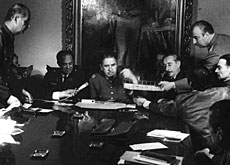Switzerland reflects on the death of Pinochet

The Swiss foreign ministry says the military dictatorship of former Chilean strongman Augusto Pinochet will always be associated with grave human rights abuses.
The ex-general who ruled Chile with an iron fist for 17 years was pursued by the Swiss justice authorities on several occasions.
Foreign ministry spokesman Johann Aeschlimann said Chile had fortunately managed to free itself of Pinochet’s influence.
“Chile today is a country of modern law, democratic and economically dynamic, with which Switzerland has good relations,” he told the Swiss news agency.
The Chilean ambassador to Switzerland, Carolina Rossetti, said Pinochet had a long time for her been a person of the past.
“But this past allowed us to find the truth about all the victims of his power, the disappeared and those detained.
The Swiss non-governmental organisation Trial Watch, which tracks impunity worldwide, said Pinochet’s arrest in London in 1998 represented a victory because it advanced the NGO’s cause, even though the former dictator eventually returned home.
“Of course we regret that he has died unpunished. He should have been convicted,” the organisation’s vice president François Membrez told swissinfo.
“But this file is not now closed. Some of his right-hand men are still alive. They must be brought before justice and light shed on what happened.”
Little sympathy
Swiss editorialists showed little sympathy in their columns in Monday’s newspapers.
The Geneva newspaper Le Temps headlined its main story: The unpunished dictator.
“Pinochet will remain in history a particularly hideous figure. During his long reign as head of Chile, he imposed a regime of terror which resulted notably with the death or disappearance of 3,000 people,” it commented.
Although he died a free man, the Tribune de Genève said he was nonetheless defeated.
“These past years, he lived hounded by justice for corruption or human rights abuses. And everywhere in Latin America, dictatorship has given way to democracy.”
Zurich’s Tages-Anzeiger commented that the majority of Chileans would be relieved by Pinochet’s death.
“Without him, they hope that it will be easier to come to terms both judicially and morally with the dark years of Chile’s military dictatorship. And with that to lay the foundation for a later reconciliation.”
Legal action
Geneva justice officials asked for Pinochet’s extradition in 1998 in the case of a student with dual Swiss-Chilean citizenship who disappeared during the dictator’s rule.
The student, Alexei Jaccard, vanished in the Argentine capital, Buenos Aires, 1977. His relatives accused the Argentine authorities and Chile’s secret service of abducting him.
The Geneva public prosecutor opened an investigation against Pinochet on suspected murder, abduction and depriving a person of his liberty.
Pinochet was arrested in London where he was to undergo an operation. But his doctors declared him unfit to stand trial and the British authorities later released him.
Another victim of Chilean military authorities was the former Swiss leftwing activist Pierre Rieben, who was arrested in the Chilean capital, Santiago, in 1974 and allegedly tortured.
swissinfo with agencies
5,833 Chilean citizens applied for asylum in Switzerland between 1973 and 2006.
1,494 of them were granted refugee status. The government initially wanted to accept about 200, but had to give in to pressure from support groups, notably in the Ticino region.
Last month Switzerland and Chile singed a deal on legal assistance, including an accord aimed at repatriating rejected asylum seekers.
At the end 2005, there were 3,564 Chilean residents in Switzerland.
Pinochet’s assets abroad total $32 million (SFr38.6 million) according to the United States Senate Committee against Money Laundering.
Some of the funds are suspected to be in Switzerland, but justice officials are quoted as saying no money belonging to Pinochet has been found in bank accounts.
Chile has demanded the release of bank documents and the Federal Prosecutor’s Office in October decided in favour of granting judicial assistance.

In compliance with the JTI standards
More: SWI swissinfo.ch certified by the Journalism Trust Initiative

You can find an overview of ongoing debates with our journalists here. Please join us!
If you want to start a conversation about a topic raised in this article or want to report factual errors, email us at english@swissinfo.ch.